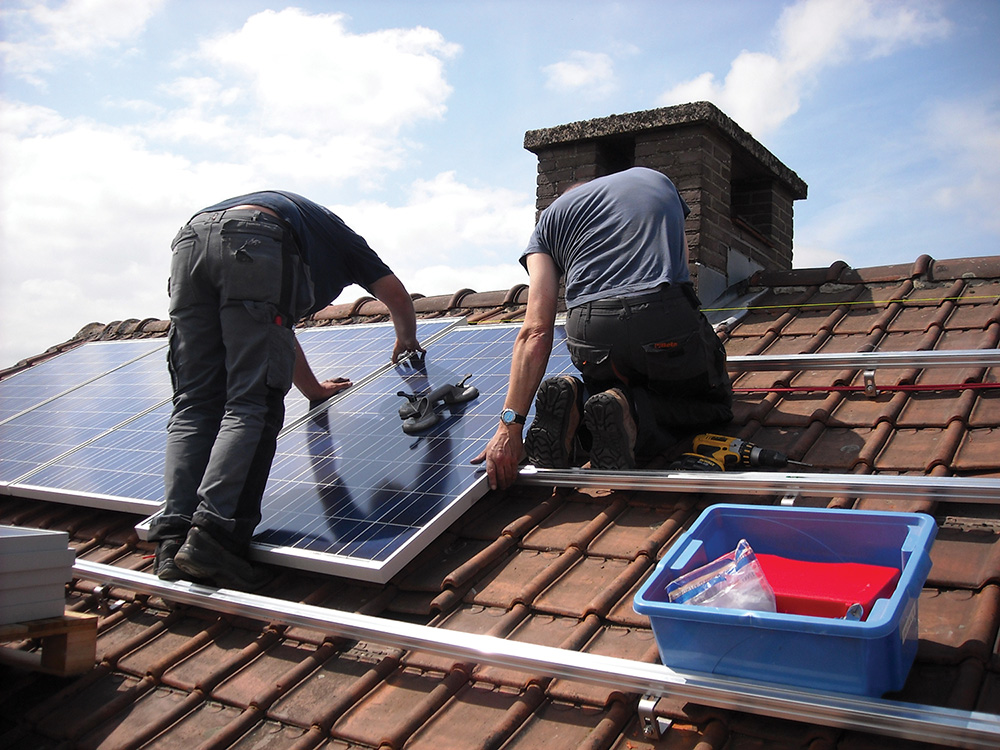
By Pat Keegan and Brad Thiessan
Q: I’m hearing a lot about solar power as an efficient option for homes today. Can you tell me some of the basics about solar energy and whether it’s something I should pursue?
A: Solar can provide energy for your home in three ways:
Passive solar is a way to capture the sun’s heat directly, often through south-facing windows and dark-colored stone floors that can store heat.
Solar water heating systems typically have panels on a roof that collect solar energy and a pump that circulates heated water for storage in a water tank.
Photovoltaic (PV) systems also collect solar energy through a panel, but the PV panels actually convert the energy into electricity.
I suspect you are referencing PV systems, which have skyrocketed in popularity in recent years. PV technology has improved, costs have dropped and financing offers are abundant.
PV panels are usually installed on a roof in an array. The panels generate direct current (DC) power, which is then channeled through an inverter that feeds electricity into the home, back to the electric grid or to a battery system where it is stored for future use.
Several factors go into calculating how cost-effective it would be to install a solar power system for your home. Once you’ve done your research, you can use the PVWatts Calculator (at http://pvwatts.nrel.gov/) to estimate how much production and value a PV system on your home could yield.
An easier path is to find a qualified solar contractor to provide an estimate for a PV system. Look for contractors that are certified with the North American Board of Certified Energy Practitioners (NABCEP). Your local electric co-op may also have a list of recommended solar contractors.
When you call contractors, they will typically ask several questions to determine if your home is a good candidate for solar. If it is, they will likely be able to provide an estimate. In order to complete an estimate, the contractor will need to determine the size of the system, which will depend on several factors, including:
- Your current and anticipated electricity needs
- Roof area, orientation and pitch (15 to 40 degrees is ideal)
- The amount of sunlight your home receives per year
- The amount of shade, dust, snow and/or other factors that can block sunlight
If your roof will need replacing in the next few years, you’ll want to do that before installing solar panels, so be sure to include that expense when calculating the overall cost.
There may be federal, state and utility tax credits and rebates available to offset the price of the equipment and installation. You can find links to these resources on my website at www.collaborativeefficiency.com.
If the estimate you receive includes all the factors we’ve mentioned in this article, it should give you a fairly accurate idea of your return on investment. It’s also a good idea to get multiple estimates if you can, and to review the estimate with your electric co-op to ensure the electric rate and metering arrangements are correct.
Before you make a final decision, consider the following questions:
• How does the investment in a PV system compare to upgrading the energy efficiency of your home? Efficiency upgrades can sometimes yield more bang for your buck and make your home more comfortable. A home energy audit can help you answer this question.
• Is there a better way to invest in solar energy? Many co-ops offer community solar programs, which can produce solar electricity at a lower cost than residential systems.
Investment in solar systems or energy efficiency upgrades to your home can help increase the resale value. Recent reports show that the presence of a PV system can raise a home’s resale value to an average of $15,000.
I hope these tips help you determine if a PV system is right for your home. Remember, your local electric co-op can be a great resource, so reach out to them if you have any additional questions.
This column was co-written by Pat Keegan and Brad Thiessen of Collaborative Efficiency. For more information on solar energy for your home, please visit: www.collaborativeefficiency.com/energytips.
Patrick Keegan writes on consumer and cooperative affairs for the National Rural Electric Cooperative Association, the Arlington, Va.-based service arm of the nation’s 900-plus consumer-owned, not-for-profit electric cooperatives. Write to [email protected] for more information.




